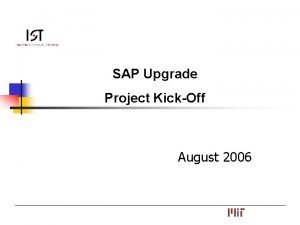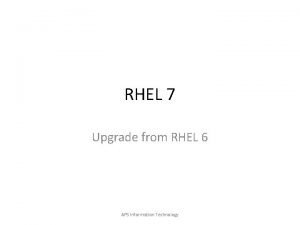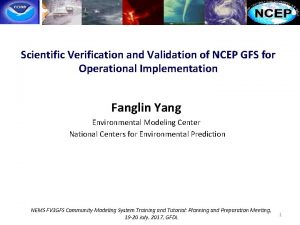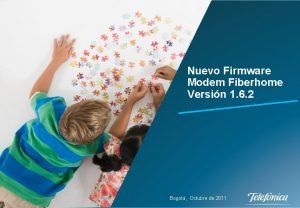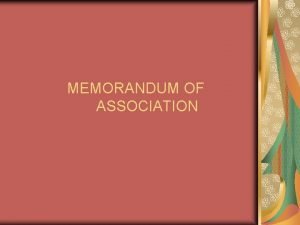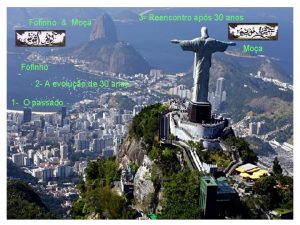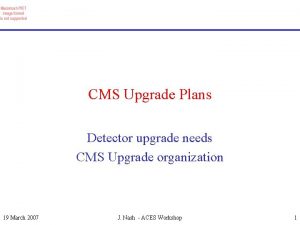Upgrade plan of the MOA 1 8 m

















- Slides: 17

Upgrade plan of the MOA 1. 8 -m telescope F. Abe MOA collaboration 19 Jan. 2009, 13 th Microlensing Workshop @ Paris

Discovery of Neptune • In 1846, a mathematician of Observatoire de Paris, Le Verrier predicted a new planet • Independent prediction was made by Adams, UK • Then, Neptune was discovered by Galle at Berliner Sternwarte as per their predictions Urbain Jean Joseph Le Verrier Predictions were essential John Couch Adams

Discovery of OGLE 2005 -BLG-390 Lb Unpredictable Beauliu, et al. , 2006

Discovery of MOA 2007 -BLG-192 Lb Single lens light curve MOA high-cadence observations OGLE observations Bennett, et al. , 2007

Real time detection of anomaly OGLE 2007 -BLG-368/MOA 2007 -BLG-308 Sumi, et al. , this WS

Short timescale events (MOA 2006 -BLG-98) t. E ~ 1 day Caused by very low-mass star(? ): Free-floating planets (? ) Brown dwarfs (? ) Kamiya, et al. , this WS

Current MOA telescope & CCD Camera • Installed at Mt. John, Observatory, NZ in 2004 • Aperture: 1. 8 m • FOV: 2. 18 4 corrector lenses degree^2 2 degree image circle • Seeing > 1. 5” • 1 observation/hour Plan of upgrade to get wider FOV Sako et al. , 2008

Optical design (by A. Rakich): Requirements & compromise • Requirements – FOV: as wide as possible – Primary mirror: use present mirror – No aspheric lens – No special low-dispersion glasses • Compromise – Replace corrector lenses – Throw out short wavelength (U, B) – Circular effective area

New corrector lenses (4 degree) All spherical surfaces 3 -4 layer coating FQ BK 7 f/2. 96 4 deg ~ 12 deg^2 BK 7 Vessel Window f/2. 91 2 deg. By A. Rakich

Spot diagram (I) 30μm ~ 1. 16” 4 degree Image circle ~12 deg^2

Spot diagram (V) Target FOV: ~ 10 deg^2

Possible CCD layout Image circle 4 degree in diameter CCD chip 3 cm x 6 cm 0. 33°x 0. 66° Total: 52 chips 11. 3 deg^2 5 -6 observations/hour Factor 5 improvement Honeycomb scan

Honeycomb survey (example) 1 2 3 Seamless survey can be made 6 5 4 without overlap 7 8 9

CCD chips & Electronics • Current CCDs – – E 2 V CCD 4882 2 k X 4 k, 3 cm x 6 cm Back illuminated QE: > 90% (500 nm), ~30% (900 nm) • Astronomical Research Camera Gen III • Hamamatsu CCDs for SUBARU – S 10892 -01 HSC – 2 k X 4 k, 3 cm X 6 cm – Back illuminated, full depletion (developed by LBNL) – QE: ~90% (600 -850 nm) >80% (900 nm) – Factor 2 improvement • Astronomical Research Camera Gen III

Time schedule Oct 30 Apr 1 July Installation R&D, cost estimate Proposal Blanks Lenses CCDs etc. Camera Polish assemble Assemble Tests High quality alert: ~ 2013 Tests Science Observations 2009 2010 2011 2012

Summary • High-cadence observations using wide FOV are essential in new generation microlensing planet search • MOA Group is planning to upgrade existing 1. 8 m telescope to get ~ 10 deg^2 FOV • Design of the new optics has been done. • Technical studies of the CCD camera are going to start to solve several problems • After several technical studies and cost estimate, we will submit the first proposal in this October. • If it’s approved, observation will be started in the 2012 bulge season

Merci de votre attention
 Database upgrade project plan
Database upgrade project plan Sap upgrade project plan
Sap upgrade project plan Microsoft server
Microsoft server Visio 2010 updates
Visio 2010 updates Upgrade image quality
Upgrade image quality Red hat aps
Red hat aps Remedy upgrade
Remedy upgrade Acs to ise migration tool
Acs to ise migration tool Cisco ios upgrade planner tool
Cisco ios upgrade planner tool What is vue vip seating
What is vue vip seating Caloundra bruce highway upgrade
Caloundra bruce highway upgrade Windws update
Windws update Autonomous to lightweight mode upgrade tool
Autonomous to lightweight mode upgrade tool Past perfect use
Past perfect use Www.state.nj.us/mvc/licenses/ document selector/index.htm
Www.state.nj.us/mvc/licenses/ document selector/index.htm Gfs upgrade
Gfs upgrade Fiberhome hg6243c firmware download
Fiberhome hg6243c firmware download Maximo upgrade resources
Maximo upgrade resources

